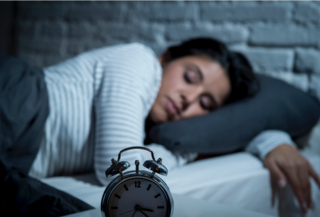
Sleep
Are You Really Getting a Good Night's Sleep?
What your brain activity can—and can't—tell you about your sleep.
Posted March 15, 2019

What would you call a good night's sleep? Like most of us, you would probably describe a good night’s sleep as one where you fall asleep easily, sleep through the night without tossing and turning or waking frequently, and ultimately wake up in the morning feeling refreshed. But what do we actually know about sleep itself? What is it doing?
The generally accepted theory is that sleep allows your brain to retreat from the sensory bombardment of the day so that it can carry out cellular housekeeping and also commit to memory things learned during waking hours. The patterns of brain activity responsible for making sure that these nighttime functions are carried out efficiently are slowly being revealed.
Measuring Your Sleep
You may have heard of different stages of sleep, such as non-rapid eye movement sleep (NREM) and rapid eye movement sleep (REM), appearing in a cyclical fashion through the night. As you might guess, this definition is largely based on recordings of eye movements. In fact, sleep has typically been characterized based on measures that relate to physical behavior, such as your muscle tone and movements, your eye movements, and your breathing rates and heartbeat. How is this related to what is going on in the brain and the goals that sleep aims to achieve?
Studies have tried to look more directly at the brain to uncover this, recording the tiny electrical fluctuations that can be measured on the surface of the head (called electroencephalography or EEG for short). NREM and REM seem to be different in the brain as well, with NREM more likely to have slower brain frequencies than REM. However still, even within NREM and REM sleep, there are a wide variety of different characteristics in the brain’s activity.
The challenge is to understand what they mean. Does more movement or certain features of the brain signal mean poorer sleep? What is "good" sleep?
Dreaming in REM
You have probably heard that REM sleep means that you are dreaming. One idea that has been around a long time is that dreaming allows you to reactivate and reorganize your memories, helping you strengthen them in your long-term memory. While we don't know for sure if this is true, recent research has shown that it isn’t as simple as saying that REM sleep is dreaming sleep.
In a study done at the University of Wisconsin, for example, participants spent the night in a sleep lab, where they were woken up several times regardless of what phase of sleep they were in. At each awakening, they asked the participants about their “mental activity” immediately prior to being woken. Their results revealed that dreaming wasn't exclusive to the REM sleep wakings, as had previously been suggested, but also occurred during NREM sleep as well. They also looked in more detail at the pattern of brain activity that was going on when the participants did report that they were dreaming and found certain similarities irrespective of whether the awakening was in REM or NREM.
Making Memories in Slow Waves
In some ways counter to the dreaming hypothesis, one particular research direction has focused on the role of NREM slow-wave sleep in making memories. For example, researchers from the University of Lübeck found that applying an electrical current to the surface of people’s heads at a slow, oscillating frequency (0.75Hz) when they were in NREM sleep led to an increase in their slow waves. Importantly, this increase in slow-wave sleep had the concurrent effect of boosting their memory for information that they had learned the previous day (when they were tested on the information the following morning). Yet others have shown that it isn’t just your slow waves that are important for consolidating your memories during sleep, but instead provide evidence that it might be the way that these slow waves coordinate with other electrical features present during your NREM sleep that really matters.
Beyond Sleep Stages
Dividing sleep into individual stages is a useful shorthand for depicting the progression of what is going on in your brain while you sleep. However, these kinds of findings reveal that it is an oversimplification of the complex patterns of brain activity which underpin the many active and passive functions that occur while your conscious mind is momentarily unplugged. While progress is being made, it isn’t yet clear how to measure a good night's sleep. Until then, focusing on the tossing and turning—and how you feel at the end of the night—may be the best indicator.
Facebook image: Mladen Zivkovic/Shutterstock
LinkedIn image: antoniodiaz/Shutterstock
References
Brown, R., Basheer, R., McKenna, J., Strecker, R., & McCarley, R. (2012). Control of Sleep and Wakefulness. Physiological Reviews, 92(3), 1087-1187.
Marshall, L., Helgadóttir, H., Mölle, M., & Born, J. (2006). Boosting slow oscillations during sleep potentiates memory. Nature, 444(7119), 610-613.
Helfrich, R., Mander, B., Jagust, W., Knight, R., & Walker, M. (2018). Old Brains Come Uncoupled in Sleep: Slow Wave-Spindle Synchrony, Brain Atrophy, and Forgetting. Neuron, 97(1), 221-230
Siclari, F., Baird, B., Perogamvros, L., Bernardi, G., LaRocque, J., & Riedner, B. et al. (2017). The neural correlates of dreaming. Nature Neuroscience, 20(6), 872-878.
Siclari, F., & Tononi, G. (2017). Local aspects of sleep and wakefulness. Current Opinion In Neurobiology, 44, 222-227.

